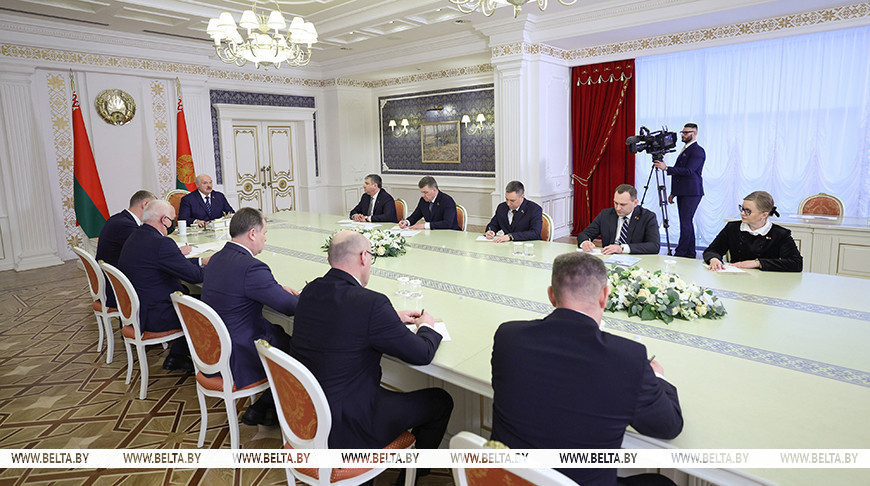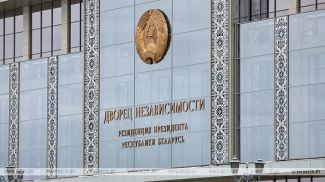
MINSK, 4 March (BelTA) – While making personnel decisions on 4 March, Belarusian President Aleksandr Lukashenko outlined key tasks for ministries and government agencies supervised by Deputy Prime Minister Yuri Shuleiko, BelTA has learned.
The head of state named the issues that the deputy prime minister and the ministers will have to deal with personally. In particular, this concerns the agricultural industry, forestry, natural resources, and consumer cooperatives.
On agriculture
The head of state also touched upon dairy production. He remarked that three regions, including Vitebsk Oblast, significantly lag behind in dairy herd productivity. Simply put, they get much less milk from one cow than other regions of the country. And this problem must be solved, because these regions have sufficient forage resources and everything is in place to increase milk output. The responsibility for failing to resolve this issue will be very serious, Aleksandr Lukashenko emphasized.
Another problem associated with dairy production concerns cattle growing. “We should phase out small dairy farms. And the remaining small farms should be in perfect condition and use the same technology as dairy complexes,” the president remarked. The head of state gave five years to upgrade all complexes in the country. “It has already been determined how to build them and how much it will cost. We know where we need to build these livestock complexes. Do not delay doing it,” he added.
Speaking about other important matters requiring attention, the head of state named the performance of industry flagships, like Belarusian National Biotechnology Corporation, as well as distribution networks outside the country and, in general, the work on foreign markets. “All profits should flow in to the country. Otherwise, what's the point of working in Russia or other countries, setting up various types of production facilities there, including assembly factories, localizing and producing goods there, like in Belarus? Why are we doing this? We are transferring jobs and technologies, and we should get a profit. Therefore, we need to buckle down and make money,” Aleksandr Lukashenko said.
After all, the government has done a lot for the agricultural sector, it has created conditions for increasing the agricultural output. And this should be done rather fast, at about 5-6% annually. The task is rather challenging, given that the current agricultural output is big enough.
“We should harvest 11 million tonnes of grain annually. It is a must,” the head of state said. “11 million tonnes of grain is something we should harvest every year. I mean cereals, legumes, rapeseed, corn and so on”.
Another task is to produce more than 9 million tonnes of milk and more than 2 million tonnes of meat in 2025 and to ensure the shelf-life management and sale of these products.
Belarus’ food exports should reach $9 billion by the end of this year. “I do not ask for more,” the president said, specifying that Belarus has already reached this figure and needs to hold its position.
While discussing tasks and prospects for the agricultural industry, Aleksandr Lukashenko touched upon the state of fields and winter crops. “We need to look closely at the wintering of winter crops. Snow will melt in the coming days. I am not rushing you to embark on agricultural work. We need to keep in mind that there may still be frosts. You need to figure out what needs to be done. There is work to do in the fields. It needs to be done, especially in the south of the country,” the president said.
Soil fertility was discussed separately, and Aleksandr Lukashenko called it a priority matter. Belarus does not have such vast swathes of black soil as the neighboring Ukraine does, and the soil here is generally heavy. “We need to treat it. Fertility is a priority matter,” the head of state said. He also recalled the tasks related to land reclamation.
Addressing the new Agriculture and Food Minister Yuri Gorlov, the president noted that he would have difficult, intense work ahead: “You understand that there is extremely difficult work to do both in healthcare and agriculture. You won't have any respite. Although all the ministries and ministers in attendance have enough work, but nevertheless...”
Forestry
Speaking about the tasks for Forestry Minister Aleksandr Kulik and the forestry sector in general, the president first asked about progress to remove fallen trees and to process raw materials after the storm that swept across the country in the summer of 2024. “Will you be able to clear the windfall [within the established deadlines]?” the head of state asked.
“Yes, we will,” the minister replied.
Aleksandr Lukashenko warned that deadlines will not be extended again, and that there will be serious oversight over the work, including by the State Control Committee. “Make sure that everything you promised will be done,” the president said.
The head of state gave a task to increase the depth of processing of wood raw materials, their volumes will gradually increase in Belarus. “We process very little wood. I fly over the country and see that in some places there is so much windfall!.. We need to clear it and recycle it quickly. We need to do everything in time,” Aleksandr Lukashenko emphasized.
The president named reforestation one of the priority tasks for the Forestry Ministry. “I really count on you, because you are a true forester. I really hope that you love the forest as much as I do,” the head of state said addressing Aleksandr Kulik. “This is our asset, it is important for people's health, crucial for the entire country. Anyone who has such forests is truly rich in every sense. The forest is everything.”
Natural resources and environmental protection
Assigning tasks for the Ministry of Natural Resources and Environmental Protection, the head of state started with geological exploration.
“It is the number one topic today,” Aleksandr Lukashenko said. Due to the well-known circumstances, the whole world is now talking about rare earth minerals. “They say we have rare earth minerals here. We also need to explore other deposits: chemistry, oil, gas, and so on. I have already set a corresponding task for the minister,” the head of state said.
Geological exploration is underdeveloped in the country, the president added. Domestic specialists overlook the rare earth mineral exploration issue. “Rare earth minerals - [U.S. President Donald] Trump knows these words very well. You have not even thought about them yet. There are not a lot of them in the earth. Perhaps, we have them as much as others,” the head of state said.
Addressing the deputy prime minister, the president continued: “Therefore, the Minister of Natural Resources and Environmental Protection will have to work hard together with you. This is the future. We have to dig and explore what deposits we have.”
Consumer cooperatives
During the conversation with the ministers and heads of government agencies supervised by Deputy Prime Minister Yuri Shuleiko, Aleksandr Lukashenko discussed the work of Belkoopsoyuz. Inessa Korotkevich was elected chairperson of the Belkoopsoyuz board in February 2024.
“We need to plan, to see what has been achieved after the election of the new head,” said Aleksandr Lukashenko. He drew attention to the fact that the work of Belkoopsoyuz has always been overseen by the prime minister, and this should remain so in the future.
The head of state paid special attention to the work of consumer cooperatives in remote and small villages. He warned against neglecting people who live there. “They need support. Especially in the so-called depressing settlements. There is no other way. This is also a moral obligation for any government, any state. We must provide these people not only with food, but also with education and healthcare,” the president said.
The animal husbandry industry is another area of Belkoopsoyuz's activity. According to Aleksandr Lukashenko, it is necessary to overhaul it and shake it up. “It should generate profit. But we have a complete mess there, including when it comes to its assets,” he noted.
Another organization discussed at the meeting was the Belgospishcheprom food industry concern. The president set the task to upgrade production facilities and increase the processing depth at organizations subordinate to the concern. “A lot has been done for you. You must produce results. Over the next five years, we should increase the efficiency of your organizations and achieve a profitability of at least 15%. This is our task given our pricing checks. It is not an option, but a necessity,” the president said.













